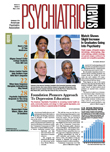Combined treatment with an antipsychotic and an antidepressant is more effective than an antipsychotic alone in patients with major depression with psychotic features, and older patients respond as well as younger patients to the treatment, according to results from the Study of Pharmacotherapy of Psychotic Depression (STOP-PD).
The study investigators released findings from the multisite, randomized, double-blind clinical trial sponsored by the national Institute of Mental Health at the annual meeting of the American Association for Geriatric Psychiatry in March.
Currently there is no drug therapy approved by the Food and Drug Administration specifically for depression with psychosis. The effectiveness of electroconvulsive therapy (ECT) has been well documented in clinical research, but access to ECT is limited, especially in the outpatient setting. The long-term treatment course of ECT for psychotic depression remains unclear as patients tend to relapse quickly after ECT ends, the presenters noted.
Although patients with this disorder make up a sizable subset of the unipolar depression patient population, they are frequently mis-diagnosed, said Anthony Rothschild, M.D., a professor of psychiatry at the University of Massachusetts Medical School. The symptoms, including delusions and hallucinations, persistent guilt, increased psychomotor symptoms, paranoia, and hypochondriasis, are often subtle and not anticipated by physicians. Many patients are reluctant to discuss their delusions or persistent, disturbing thoughts.
The STOP-PD began enrollment in 2003 and intentionally recruited adults older than age 60 for half of the study population. A total of 259 patients were randomized.
Patients were randomly assigned to receive either olanzapine plus sertraline (n=129) or olanzapine plus placebo (n=130) for 12 weeks. Not only could participants withdraw voluntarily at any time, but study physicians were instructed by the protocol to withdraw patients from the study at any time if they experienced worsening psychiatric symptoms or serious side effects, or if they did not get better after five weeks of treatment. The study did not exclude those with suicidal ideation.
The combination treatment group had a statistically significantly higher remission rate at week 12 than did the olanzapine monotherapy group, Barnett Meyers, M.D., the principal investigator and a professor of clinical psychiatry at Cornell University Medical School, said. Remission, the primary outcome measure of the study, was defined as a total score on the Hamilton Depression Rating Scale of less than 17 and two consecutive assessments without delusions. The researchers found that older patients responded similarly to younger patients in terms of both efficacy and tolerability, which, the researchers admitted, was somewhat surprising as they had expected the elderly patients to suffer more side effects from the treatment and to improve less.
More patients in the monotherapy group discontinued the study before week 12 than did those in combination therapy, largely because of the lack of efficacy. However, the difference in the all-reason discontinuation rate between the two treatment groups was not statistically significant. About half of patients discontinued the trial before week 12, including one-third of patients who were withdrawn at week 5 because of the protocol-specified criteria of no improvement or worsening disease.
Benoit Mulsant, M.D., clinical director of the Geriatric Mental Health Program and a professor of psychiatry at the University of Toronto, presented the safety findings and noted that older patients did not report significantly more adverse effects than younger patients. In fact, younger patients had a higher dropout rate for reasons other than efficacy. Certain adverse effects differed between older and younger patients: weight gain from baseline was greater in younger patients, and pedal edema was more common in older patients. Other adverse effects, which included somnolence, gastrointestinal disturbance, falls, orthostatic dizziness, and treatment-related tardive dyskinesia, had similar frequencies in older and younger patients.
More detailed results of the STOP-PD trial will be presented May 7 at the 2008 APA annual meeting. ▪

